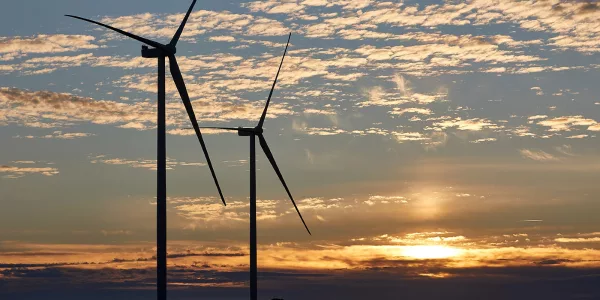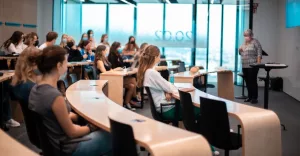For the second edition of the Alumni Spotlight series in The Stork, Global Alumni Relations interviewed Ian Armstrong, chairman of the State Development Plan of Nuevo León, member of the State Council for the Reconstruction of Nuevo León, and founder of Ric Energy in Mexico– a renewable energy company striving towards a greener future. Flying across the Atlantic for IE’s International Master’s in Business Administration (IMBA) program and arriving in Madrid was a new beginning for him. He not only welcomed the first new member of his family but also gained insights into the life of an entrepreneur.
“I think that your peers are a great resource of information once you’re in your professional life because they’ll be in their professional life, as well.”
When asked to describe his IE experience in a word, Armstrong quickly answered, “Opportunity.” In this one word, he encompassed the personal and professional growth he underwent during the IMBA and even now. He articulated:
“I can honestly say that even before IE, I wanted to start my own company. One of the things that really helped me out…was I knew my weaknesses. And I knew that IE could help me out with respect to those departments. [IE’s IMBA program] balanced me out overall.”However, when asked what prompted him to apply to IE, Armstrong stated that his decision was influenced by IE’s global reach, which gathers an array of diverse students at its campus:
“Whenever you did group work together, [things got] pretty interesting because you had that cultural clash. [You] need to know how to navigate those waters. That really helped me a lot when I went back to Mexico in my professional life.”
He continued: “[Another thing that] I really enjoyed about the program was the constant bombardment of public speaking in each class. So that really helped me a lot in my future endeavors because I love sales. And although I’m the president of [Ric Energy], I have my sales hat on [all the time].” Ultimately, these clashes taught him how to negotiate when he has to wear the hat of a salesman at his company. As a whole, Armstrong knew that an education at IE “could [fill] in the gaps of my weaknesses with respect to my overall skills…I could have a better understanding as a whole of the things that I wanted to do.”
Do you believe that entrepreneurs are made or born?
“They’re made. I think that in life, for good or for bad, everything shapes us. But I [honestly] think that it all starts in our households, [with] the education you receive [from] your parents…And then life begins, and your character starts to build up with respect to that education.” Those character-building moments can make or break the aspiring entrepreneur. Armstrong admonished that everything in life is a calculated risk, just like in business. IE was responsible for completing his toolkit to prepare him for his entrepreneurial career.
“[I remember], there was one class that I really enjoyed [called] Entrepreneurial Management, due to the span and the focus of the class…And I remember that [the professor]would say: If you have a budget, then you have to increase it by 50%. If you [are aiming for a certain] revenue and you think it’s going to be this amount, slash it by 50%.”
“[It seemed} really trivial, but I would always think about it, and it’s true. And it was even more true when I started [my] business – she was right. Because you always have [to deal with] unforeseen events and [business] is not linear – it’s very volatile. It’s always changing. The line is always moving. So, she was right, I really appreciate that. And as I said, I think that every class that [I] took in IE [added to my] arsenal.”
How challenging has it been for you to work toward and advocate for sustainability in the energy sector?
“It’s been a tough environment, I can’t deny that, but I think there are always opportunities…We’ve started to look for small gains within this environment. And I think that when Mexico opens up in the future, we’re going to be able to leverage what we’ve done for [the] past nine years with respect to power generation.”
“We’ve worked with the current political environment and regulators, in order to [find ways for our business model] to work and get [the company’s] clean benefits to our clients that need it – [again, pushing for] those small gains … [For instance], we always have an economic proposal [ready for our clients], which obviously has to do with savings with respect to energy consumption. At the same time, what I like to do is also research [other companies and their] corporate responsibility, with respect to the environment [and] community which they’re in.” All in all, Ric Energy promotes transparency that Armstrong hopes will help Mexico turn a sustainable leaf.

How do you think the new generation of professionals can contribute to advancing the sustainable agenda in their future careers?
“First, you have to think about who you impact [and who your stakeholders are]. Then, you can create a road map to see what things you can do. But the contribution has to be a significant one … [You] have to get real about that and see which [offsets] do really work [in the current environment] and strive for those ones. And then once you realize which offsets are important within your industry, well, pick the low-hanging fruit. Have quick gains in the short term so that that green agenda can gain traction within the [community].”
In sum, Armstrong notes that “the private sector needs to get involved with the public sector in order to lay down these foundations so that we can advance as a society.”
As someone who has worked in both the public and private sectors, what advice would you give to anyone looking to start a new career path?
“It all boils down to what you really like, what you’re passionate about because both sectors are tough. But it doesn’t have to be like that. So I think that in order to know what you’re passionate about, you have to have a deep conversation with yourself. And that’s not easy … Can you tune out everything, [sit] in a corner, and really think about what you want? … Once you know [what you are passionate about], it doesn’t matter if it’s in the public or private sector, [because] you’re going to do well.”
“Do what you enjoy, and the rest will follow.”
Armstrong has no concrete answer to how one can delve into their inner self to figure out the answer to this question, which seems to plague students as they creep closer to their graduation date. However, Armstrong circled back to his ideals on connection and community, “The networking part [of IE’s framework] is so important. I know that the educational part is the base, and you need that, but networking I think is the icing on the cake.”
Even if one manages to find their passion upon graduation, it can be easily lost to the changing landscape of one’s business environment. However, one will always be prepared to tackle any new challenges because, “you have all these great friends that are prepared [to help you], that are successful, that are smart.” Everyone needs a great team, and IE helps everyone find theirs, “because no woman or man is an island. You need to work as a group, always.”
Finally, Armstrong was asked how he is different today than when he graduated. His answer was simple: “More responsibilities. Family, company, extended family, friends. It’s all good. It’s chaos, but it’s beautiful.”
A leader in sustainability and clean energy, Ian Armstrong is a role model for the leaders of tomorrow. His insightful answers portray important aspects of success that are often overlooked in day-to-day conversations. Yes, to be successful, one must work hard toward their goals, but those goals must necessarily be aligned with societal values. Successful leaders do not only strive for themselves but also work hard for the development of their community.







